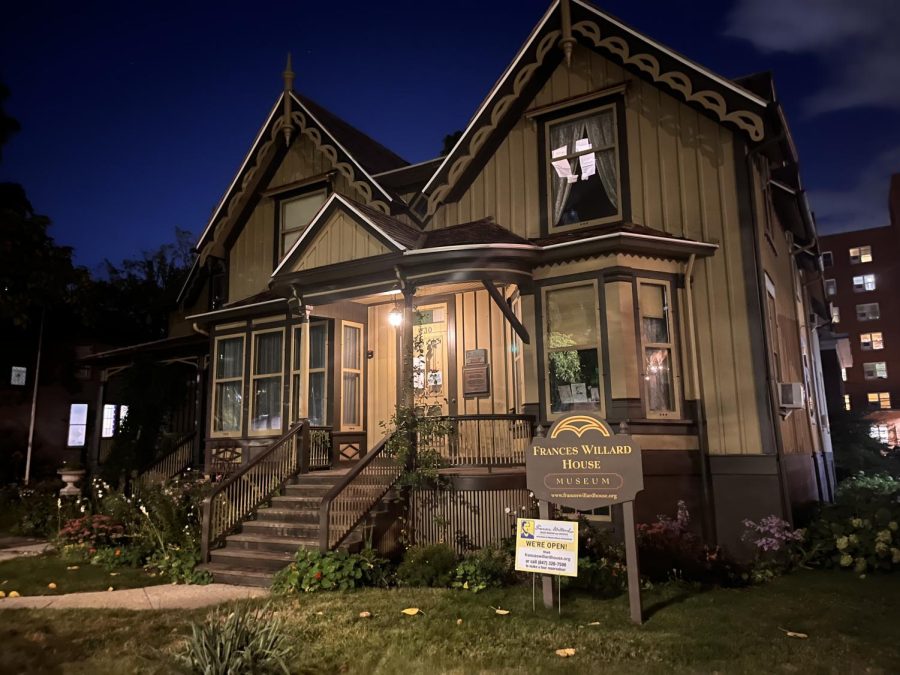Frances Willard House Museum and Archives highlights historical efforts to further women’s education in Evanston
Charlotte Ehrlich / The Daily Northwestern
The Frances Willard House Museum and Archives is honoring Willard’s legacy with its new program and content theme for the year: Knowledge is Power.
September 25, 2022
In 1859, Frances Willard graduated as part of the first class at North-Western Female College. She pushed for equal coeducation at unaffiliated Northwestern University before becoming the first dean of women at NU.
Now, the Frances Willard House Museum and Archives is honoring her legacy with its new program and content theme for the year: Knowledge is Power. The theme covers the history and prehistory of women’s higher education in Evanston, in recognition of the 150th anniversary of Willard’s role as president of the Evanston College for Ladies.
Janet Olson, archivist at the museum, said she previously worked on an exhibit highlighting the history of women’s fight for equal education at NU.
“This power base of influential women in Evanston at this time (late 1800s) really set a tone that enhanced the growth of women’s education here,” Olson said. “Evanston’s history with women’s education is typical of its time in that it developed from a female seminary model, but it was also unique because of the way Evanston was formed as a center of education.”
Fiona Maxwell, director of museum operations and communications at the Center for Women’s History and Leadership, said the museum wanted to recognize the “trailblazing” efforts of schools in Evanston with the museum’s theme.
Maxwell also said the museum wants to highlight women of color and international students in the Evanston community at the time, who she said historically are underrepresented.
“We’re debunking the myth that education at this time was only for the elite,” Maxwell said. “Highlighting the diversity of women’s experiences at Northwestern is definitely going to be a part of this. We do want to make sure that those women’s stories are highlighted.”
The museum also intends to help recognize Willard’s derogatory statements about Black men, published in 1890 of the New York Voice as part of this effort.
In 2019, the museum released “Truth Telling: Frances Willard and Ida B. Wells,” a community history project that explored a rift between Willard and Wells that occurred after Willard’s remarks.
“Well, she really was a racist,” Olson said. “So we’ve been wanting to explore such a big topic, and we wanted to figure out a way to address it.”
Coeducation and education opportunities for women in general during the mid-to-late 1800s were scarce in the United States, Olson said. Female seminaries were private educational institutions and were the most common method for women to receive an education, but women who attended only received certificates, not degrees.
In Evanston, North-Western Female College helped women propel themselves into the realm of higher education, Olson said. The college granted degrees to women as early as 1856.
Lori Osborne, director of the Frances Willard House Museum, said Evanston encouraged women’s leadership and contributions during the mid- to late 1800s.
Osborne said the city’s history is important in understanding the progression of women’s education throughout the United States.
“Evanston was leading the way and providing this place where women can feel that their contributions to public life are important,” Osborne said. “Their education is important and what they’re going to do with their education is important. That is not true in most towns in America at this time.”
Email: selenakuznikov2025@u.northwestern.edu
Twitter: @selenakuznikov
Related Stories:
— Frances Willard House Museum discusses relationship between Willard and Ida B. Wells
— Willard House Museum celebrates visionary leader’s 180th birthday with open house
— A hundred years after ratification, Frances Willard’s legacy remains vital to the 19th Amendment



